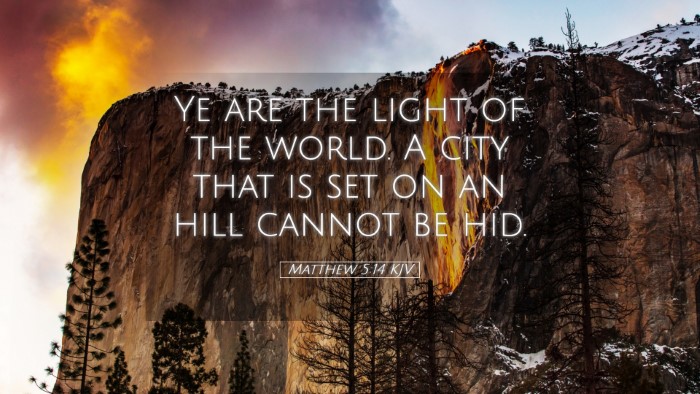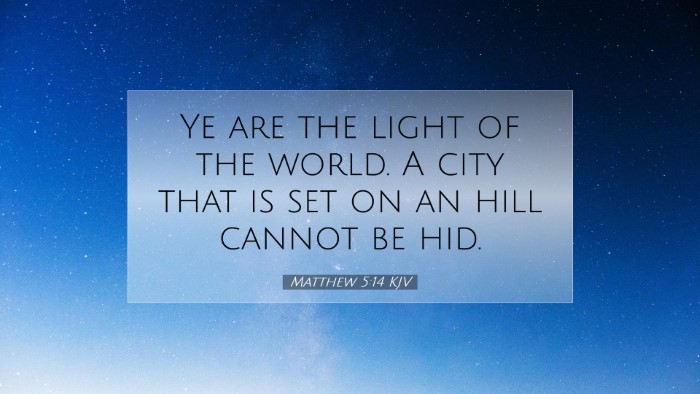Commentary on Matthew 5:14
Verse: "You are the light of the world. A city set on a hill cannot be hidden."
Introduction
Matthew 5:14 is a profound declaration made by Jesus during the Sermon on the Mount, emphasizing the identity and mission of His followers. This verse serves as both an encouragement and a charge, prompting believers to reflect their faith in a world that often dwells in darkness.
Contextual Background
This verse occurs within the Beatitudes, where Jesus outlines the characteristics of those who belong to His kingdom. The metaphor of light is used throughout Scripture to signify purity, truth, and divine revelation. In the context of first-century Palestine, light had tangible implications, especially in a community that relied heavily on natural lighting for daily activities.
Commentary Insights
1. The Identity of Believers as Light
Matthew Henry notes that being called the "light of the world" indicates not just an identity but also a responsibility. The believer's life should shine brightly, reflecting the character of Christ and drawing others towards the truth of the Gospel.
- Spiritual Illumination: Just as light dispels darkness and illuminates the path, Christians are called to testify to the truth found in Christ. Their lives must exemplify moral clarity and ethical behavior.
- Witness to Non-believers: Albert Barnes emphasizes that believers' testimonies serve to reach the lost. Light invites questions and curiosity, motivating believers to share their faith with others.
2. The City on a Hill: An Indelible Witness
Jesus uses the imagery of a city on a hill to illustrate the visibility and influence of His followers. A city that occupies such a prominent position cannot be concealed, suggesting that a true Christian community will naturally draw attention.
- Corporate Witness: Adam Clarke highlights how communities of faith act as collective lights. It is not merely individual behavior but the harmonious existence of the church that illuminates the surrounding society.
- Unavoidability of Influence: A city on a hill suggests an automatic witness to its surrounding. Similarly, believers, by their very nature, are meant to influence their culture, society, and environment.
3. The Mandate to Shine
The command to let one’s light shine is not an option but a directive. Matthew Henry indicates that failing to shine is akin to a lamp hidden under a bushel; it is a denial of one's identity and purpose.
- Active Participation: Light must be positioned in such a way as to fulfill its purpose. This calls for believers to actively engage in good works that demonstrate their faith.
- Purpose of Good Works: As Albert Barnes articulates, good deeds serve as a testament to the transformative power of grace in one's life, glorifying the Father in heaven.
4. The Contrast with Darkness
The world is often depicted as a place of spiritual darkness. The contrast presented by Jesus between light and darkness underscores the significance of living a life characterized by spiritual vitality and truth.
- Exposé of Sin: Light exposes sin and hypocrisy. Clarke suggests that through righteous living, believers can serve as a moral compass, guiding others towards righteousness.
- Call to Authenticity: Being the light of the world necessitates authenticity. A life that authentically represents Christ stands in stark contrast to the deceitfulness of the world.
Theological Implications
This metaphor presents several key theological implications:
- Doctrine of Illumination: The work of the Holy Spirit is to illuminate hearts and minds, enabling believers to grasp the truths of Christ and community of faith.
- Missional Call: The church's mission extends beyond mere gathering; it involves actively engaging society as agents of hope and transformation.
Practical Applications
As pastors, students, theologians, and scholars reflect on this text, several practical applications emerge:
- Encouragement to Live Authentically: Encourage congregations to embrace their identity in Christ, living in a manner that reflects His light.
- Utilization of Community Platforms: Utilize community outreach programs as means to exemplify the church as a city on a hill, serving the needs around you.
- Teaching on Spiritual Disciplines: Educate on the importance of spiritual disciplines that foster a vibrant connection with God, enabling brighter reflections of His glory.
Conclusion
Matthew 5:14 serves as a significant reminder of the relational and missional aspect of following Christ. Believers are not just recipients of grace but conduits of light in a world teetering on the edge of moral confusion. Embracing this call is essential for the Church to fulfill its divine purpose. Thus, let each believer shine brightly, illuminating the path for others to find the way to the Father.


